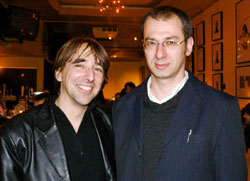From indie rock to Tennyson

Jason Camlot (left) had the opportunity to reminisce with Eugene Ostashevsky, the unconventional Russian poet currently based in New York, during a full day of readings on March 16.
marc losier
Montreal's least conventional poet is a Concordia prof who gives off the shambling, down-at-heel vibe of an indie band member. In his case, appearances are not entirely deceiving.
Jason Camlot does play bass in an outfit called Puggy Hammer, and along with a book of poems called Attention All Typewriters, (see The Journal, Oct. 27, 2005) he's released a compilation of songs called Blemish Years: 1994-1997.
But the larger point remains. Forty, lanky, with a floppy fringe of dark hair (“Thanks to Dave, Terry and Heather Pepper for taking pictures of me,” he quips in his acknowledgments. “Every day, it turns out, is a bad hair day.”), Camlot lives his life against type.
The theme of unconventionality also extends to the promiscuity with which the various parts of that life merge. Cutting an amiable figure with his black leather blazer and easy laugh, Camlot gives the sort of poetry readings — his most recent was at the Jewish Library March 14 — that are increasingly rare: calm, alert to colloquial colour, and resonantly well-phrased.
All of which is the fruit of his scholarly specialty: early spoken recordings from the Victorian period to early modernism. Indeed, to hear Camlot talk about Documenting the Phonotext, the academic book he is finishing, is to hear the excited note of a man tutored by his own findings.
“That research has certainly made me more aware of poetry recitation as an artful practice. Early spoken recordings will often sound embarrassing to most contemporary poetry readers, because the goals of a Victorian elocutionist in reciting a poem are so different from our own goals in reading a poem out loud.
“But these recordings highlight particular rhythmic, sonorous and dramatic aspects of a poem that make one think about the aural potential inherent in just about any poem, one's own poems included.”
He's not kidding. One of the most fascinating aspects of Camlot new book is its pell-mell, take-all-comers musicality.
Dazed speechless baffled flabbergasted mazed mislead/ Dumbfounded strick rebounded rattled in the head.
Unsurprisingly, that sound is itself shaped by his two great loves. There is his audiophile side, where the free-range wit so prevalent in indie song-writing flourishes (according to Camlot's blog, “shmiggles” and “dictaphonia” are among a few of his streetwise coinings he hopes will stick around).
And his scholarship is brought into play, in all senses of that word. This is seen not only in the Victorian subject matter and psychology that feed so many of Camlot's poems (especially in his debut, Animal Library) but in the great diversity of poetic forms, itself a signature of Victorian verse.
Even here Camlot has something up his sleeve. Among the rhyming couplets, sprawling riffs and kooky monologues are the song lyrics that he has a sly habit of quietly mixing in (eight in his new volume alone).
Camlot has just edited (along with Todd Swift) a collection of original essays entitled Anglo-Quebec Poetry, 1976-2006, on Montreal's English language poetry scene. But lots more poems are coming.
Camlot promises rewritings of Tennyson (where the famous Telemachus becomes “Telempathus,” so called because of his ability to transport himself into the pain of others during his dreams) and of Christina Rossetti (where her “Goblin Market” becomes “The Fruit Man”) and Yiddish translations of selected works by Oscar Wilde, retranslated into English and cast into Yiddish-inflected poems. And then, true to form, there's this:
“The other collection I'm well into writing consists largely of sonnets, bawdy courtly romances in stanzas of uniform end-rhymes, and prose poems that are parodic, brief, philosophical dissertations about consciousness, art and mortality. I don't have a real title for this book yet. But I refer to it in my head as Debauchery.”